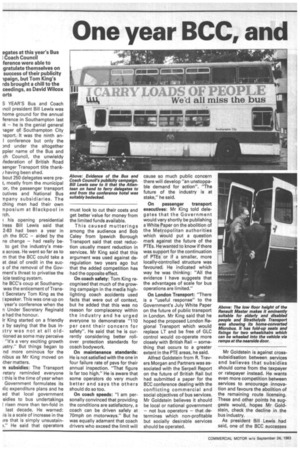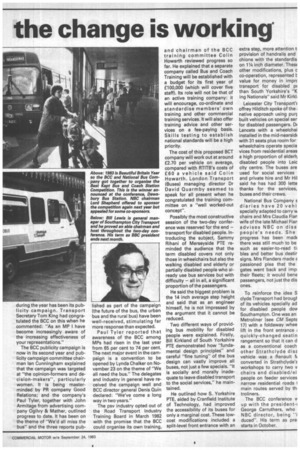One year BCC, and the change is working'
Page 32

Page 33

If you've noticed an error in this article please click here to report it so we can fix it.
egates at this year's Bus I Coach Council ference were able to gratu late themselves on success of their publicity ipaign, but Tom King's rds brought a chill to the ceedings, as David Wilcox o rts S YEAR'S Bus and Coach incil president Bill Lewis was nome ground for the annual ference in Southampton last
— he is the genial general lager of Southampton City lsport. It was the ninth anI conference but only the 3nd under the altogether ppier name of the Bus and ch Council, the unwieldy 'federation of British Road senger Transport title thank/ having been shed.
bout 250 delegates were pret, mostly from the municipal :or, the passenger transport cutives and National Bus npany subsidiaries. The ching men had their own nposium at Blackpool in rch.
his opening presidential lress Bill Lewis said that 2-83 had been a year in ch the BCC — aided by the ne change — had really be to get the industry's mese across. He went so far as to m that the BCC could take a at deal of credit in the suc s of the removal of the Govment's threat to privatise the icle testing system.
he BCC's coup at Southampwas the enticement of TransSecretary Tom King as the t speaker. This was one up on year's conference when the n Under Secretary Reginald e had the honour.
Ir King started on a friendly a by saying that the bus in;try was not at all oldlioned as some may perceive "it's a very exciting growth Jstry." But things began to nd more ominous for the nibus as Mr King moved on 'ther matters.
In subsidies: The Transport retary reminded everyone t this is the time of year when Government formulates its ilic expenditure plans and he ed that local government sidies to bus undertakings I risen more than ten-fold in last decade. He warned: 'is is a scale of increase in the ire that is simply unsustain He said that operators must look to cut their costs and get better value for money from the limited funds available.
This caused mutterings among the audience and Bob Caley from Ipswich Borough Transport said that cost reduction usually meant reduction in services. Mr King said that this argument was used against deregulation two years ago but that the added competition has had the opposite effect.
On coach safety: Tom King recognised that much of the growing campaign in the media highlighting coach accidents used facts that were out of context, but he added that this was no reason for complacency within the industry and he urged everyone to demonstrate "110 per cent their concern for safety". He said that he is currently considering better rollover protection standards for coach bodywork.
On maintenance standards: He is not satisfied with the one in four failure rate of psvs for their annual inspection. "That figure is far too high." He is aware that some operators do very much better and says the others should do so too.
On coach speeds: "I am personally convinced that providing the conditions are satisfactory, a coach can be driven safely at 70mph on motorways." But he was equally adamant that coach drivers who exceed the limit will On passenger transport executives: Mr King told delegates that the Government would very shortly be publishing a White Paper on the abolition of the Metropolitan authorities which would put a question mark against the future of the PTEs, He wanted to know if there was support for the continuation of PTEs or if a smaller, more locally-controlled structure was favoured. He indicated which way he was thinking: "All the evidence I have suggests that the advantages of scale for bus operations are limited."
On London Transport: "There is a "useful response" to the Government's July White Paper on the future of public transport in London. Mr King said that he hoped the proposed London Regional Transport which would replace LT and be free of GLC control would co-operate more closely with British Rail — something that occurs to a greater extent in the PTE areas, he said.
Alfred Goldstein from R. Travers Morgan and Partners was associated with the Serpell Report on the future of British Rail but had submitted a paper for the BCC conference dealing with the conflicting commercial and social objectives of bus services. Mr Goldstein believes it should be local or national government — not bus operators — that determines which non-profitable but socially desirable services should be operated. Mr Goldstein is against crosssubsidisation between services and believes that subsidies should come from the taxpayer or ratepayer instead. He wants even more competition between services to encourage innovation and favours the abolition of the remaining route licensing. These and other points he suggests would, hopes Mr Goldstein, check the decline in the bus industry.
As president Bill Lewis had said, one of the BCC successes during the year has been its publicity campaign. Transport Secretary Tom King had congratulated the BCC on this when he commented: "As an MP I have become increasingly aware of the increasing effectiveness of your representations."
The BCC publicity campaign is now in its second year and publicity campaign committee chairman Ian Cunningham explained that the campaign was targeted at "the opinion-formers and decision-makers", particularly women. It is being masterminded by PR company Good Relations; and the company's Paul Tyler, together with John Armitage from advertising company Ogilvy & Mather, outlined progress to date. It has been on the theme of "We'd all miss the bus" and the three reports pub
lished as part of the campaign (the future of the bus, the urban bus and the rural bus) have been well-received, stimulating far more response than expected.
Paul Tyler reported that awareness of the BCC among MPs had risen in the last year from 65 per cent to 74 per cent. The next major event in the campaign is a convention to be opened by Lynda Chalker on November 23 on the theme of "We all need the bus." The delegates and industry in general have received the campaign well and BCC director general Denis Quin declared: "We've come a long way in two years."
The psv industry opted out of the Road Transport Industry Training Board in March 1982 with the promise that the BCC could organise its own training, and chairman of the BCC training committee Colin Howarth reviewed progress so far. He explained that a separate company called Bus and Coach Training will be established with a budget for its first year of £100,000 (which will cover five staff). Its role will not be that of an active training company: it will encourage, co-ordinate and standardise members' own training and other commercial training services. It will also offer training advice and other services on a fee-paying basis. Skills testing to establish national standards will be a high priority.
The cost of this proposed BCT company will work out at around £2.70 per vehicle on average, compared with RTITB's costs of £60 a vehicle said Colin Howarth. London Transport (Buses) managing director Dr David Quarmby seemed to speak for all present when he congratulated the training committee on a "well worked-out concept".
Possibly the most constructive session of the two-day conference was reserved for the end — transport for disabled people. Introducing the subject, Sammy Rihani of Merseyside PTE reminded the audience that the term disabled covers not only those in wheelchairs but also the walking disabled and elderly or partially disabled people who already use bus services but with difficulty — all in all, a significant proportion of the passengers.
He said the biggest problem is the 14 inch average step height and said that as an engineer himself, he is not impressed by the argument that it cannot be reduced.
Two different ways of providing bus mobility for disabled people were explained. Firstly, Bill Kirkland of South Yorkshire PTE demonstrated how "fundamental design principles" and careful "fine tuning" of the bus design can vastly improve all buses, not just a few specials. "It is socially and morally inadequate to leave disabled transport to the social services," he maintained.
He outlined how S. Yorkshire PTE, aided by Cranfield Institute of Technology, had improved the accessibility of its buses for only a marginal cost. These lowcost modifications included a split-level front entrance with an extra step, more attention t. provision of handrails and chions with the standardis on 11/4 inch diameter. Thes: other modifications, plus c co-operation, represented t value for money in imprc transport for disabled p: than South Yorkshire's "K ing Nationals" said Mr Kirkl.
Leicester City Transport': offrey Hilditch spoke of the native approach using purr built vehicles on special ser for disabled passengers. 13( Lancets with a wheelchai installed in the mid-nearsid( with 31 seats plus room for wheelchairs operate specia vices from residential areas a high proportion of elder!) disabled people into Leic city centre. The buses are used for social services and private hire and Mr Hil said he has had 300 lette thanks for the services, buses and their crews.
National Bus Company s diaries have 20 vehi specially adapted to carry w chairs and Mrs Claudia Flan wife of the late Michael Flan advises NBC on disa people's needs. She progress has been math there was still much to be such as easier-to-read til bles and better bus destir signs. Mrs Flanders made E passioned plea that the gates went back and impl their fleets; it would bene passengers, not just the dis ones.
To reinforce the idea S clyde Transport had brouglof its vehicles specially ad for disabled people doo Southampton. One was an Metroliner (see CM Sept€ 17) with a foldaway whee lift in the front entrance quickly-changed seatin rangement so that it can d as a conventional coach other Strathclyde dise vehicle was a Renault r1, converted in Strathclyde's workshops to carry two v chairs and disabled/el people on feeder services narrow residential roads 1 main routes served by th. troliners.
The BCC conference v up with the president-1 George Carruthers, who NBC director, being "i duced". His term as pro. starts in October.
























































































































